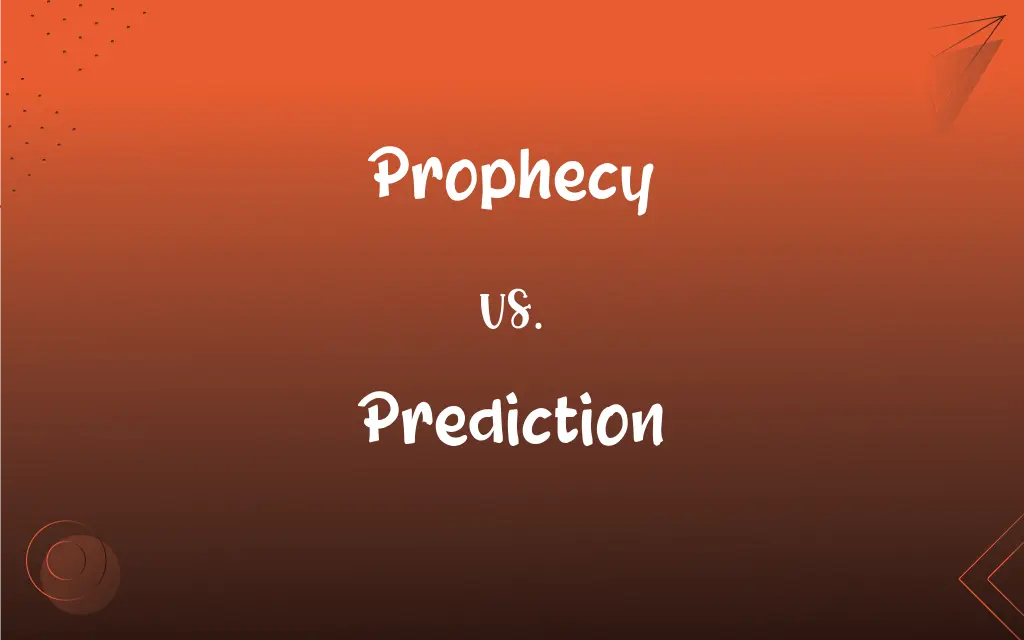Prophecy vs. Prediction: What's the Difference?
Edited by Janet White || By Harlon Moss || Published on December 7, 2023
Prophecy is a divinely inspired revelation or interpretation of future events, while prediction is a statement about the future based on analysis or conjecture.

Key Differences
Prophecy often has religious or spiritual connotations, suggesting divine or supernatural insight into future events. In contrast, prediction is based on data, trends, or logical inference, lacking a mystical element.
Predictions are commonly found in science, economics, and weather forecasting, relying on empirical evidence and analysis. Prophecies, however, are typically associated with religious texts or spiritual leaders, and are believed to be revelations from a higher power.
The accuracy of a prophecy is often a matter of faith or interpretation, not necessarily subject to empirical verification. Predictions, however, can be tested and validated through observation and data.
Prophecies can include vague or symbolic language, open to various interpretations. Predictions are usually more specific and based on observable factors.
Prophecies can influence the beliefs and actions of individuals or groups, while predictions are often used to inform decisions and prepare for future possibilities in a more practical context.
ADVERTISEMENT
Comparison Chart
Basis
Divine or supernatural insight.
Data, trends, or logical inference.
Common Usage
In religious or spiritual contexts.
In scientific, economic, and practical contexts.
Nature of Language
Often symbolic or vague.
Typically specific and empirical.
Verification
Based on faith or belief, less empirically testable.
Testable and verifiable through observation.
Impact on Decision-Making
Influences based on faith or spiritual guidance.
Informs practical decisions and preparations.
ADVERTISEMENT
Prophecy and Prediction Definitions
Prophecy
A revelation from a supernatural source.
His dreams were filled with prophecy about an impending disaster.
Prediction
A statement about what will happen in the future.
The scientist's prediction about climate change was alarming.
Prophecy
A divinely inspired prediction of the future.
The ancient prophecy foretold the rise of a great leader.
Prediction
An educated guess based on analysis.
His prediction of the election outcome was based on polling data.
Prophecy
A foretelling of future events by a prophet.
Her prophecy of the city's fall came to pass, just as she had spoken.
Prediction
A forecast of future events based on current trends.
Economists made a grim prediction for the global economy.
Prophecy
A spiritual prediction with religious significance.
The prophecy in the sacred texts guided the followers' beliefs.
Prediction
A conjecture about future occurrences.
His prediction that the team would win was just wishful thinking.
Prophecy
An inspired utterance of a prophet, viewed as a revelation of divine will.
Prediction
An inference about future events from present conditions.
Based on the data, her prediction for the market was optimistic.
Prophecy
A prediction of the future, made under divine inspiration.
Prediction
The act of predicting.
Prophecy
Such an inspired message or prediction transmitted orally or in writing.
Prediction
Something foretold or predicted; a prophecy.
Prophecy
The vocation or condition of a prophet.
Prediction
A statement of what will happen in the future.
Prophecy
A prediction.
Prediction
(statistics) A probability estimation based on statistical methods.
Prophecy
A prediction, especially one made by a prophet or under divine inspiration.
French writer Nostradamus made a prophecy in his book.
Prediction
The act of foretelling; also, that which is foretold; prophecy.
The predictions of cold and long winters.
Prophecy
The public interpretation of Scripture.
Prediction
The act of predicting (as by reasoning about the future)
Prophecy
A declaration of something to come; a foretelling; a prediction; esp., an inspired foretelling.
He hearkens after prophecies and dreams.
Prophecy came not in old time by the will of man.
Prediction
A statement made about the future
Prophecy
A book of prophecies; a history; as, the prophecy of Ahijah.
Prophecy
Public interpretation of Scripture; preaching; exhortation or instruction.
Prophecy
Knowledge of the future (usually said to be obtained from a divine source)
Prophecy
A prediction uttered under divine inspiration
Prophecy
A visionary prediction of future events.
The oracle's prophecy was both enigmatic and alarming.
FAQs
Can a prophecy be scientifically proven?
Typically, no, as prophecies are often based on faith and spiritual beliefs.
Are predictions always accurate?
Not always; predictions are best estimates based on available information.
Do prophecies always come true?
Belief in a prophecy's fulfillment is often a matter of faith or interpretation.
How is prediction different from prophecy?
Predictions are based on data or analysis, while prophecies are believed to be divine revelations.
What defines a prophecy?
A prophecy is a divinely inspired revelation or foresight of future events.
Can anyone make a prediction?
Yes, predictions can be made by anyone using data, trends, or logical reasoning.
Do predictions have practical uses?
Yes, predictions are often used for planning and decision-making.
Do prophecies have historical significance?
Yes, many prophecies have played significant roles in historical contexts.
Are prophecies always about the future?
Generally, yes, prophecies are foresights or revelations about future events.
How do scientists make predictions?
Scientists use data, models, and empirical evidence to make predictions.
Are prophecies always religious?
Mostly, though they can also appear in mythological or cultural contexts.
Can predictions be updated over time?
Yes, predictions can be revised as new data or evidence becomes available.
Can predictions be about the past?
Predictions are typically about future events, not the past.
Is prophecy common in all religions?
Many, but not all, religions have some concept of prophecy.
Can a prophecy be vague?
Yes, prophecies often contain symbolic or metaphorical language.
Can prophecies change people's actions?
Yes, prophecies can significantly influence beliefs and behaviors.
Are predictions always specific?
Predictions can vary in specificity, depending on the data and methods used.
Can prophecies be interpreted differently?
Yes, the interpretation of prophecies can vary among individuals and cultures.
Is expertise required to make predictions?
While anyone can make predictions, more accurate predictions often require expertise.
Can technology improve predictions?
Yes, advancements in technology can enhance the accuracy of predictions.
About Author
Written by
Harlon MossHarlon is a seasoned quality moderator and accomplished content writer for Difference Wiki. An alumnus of the prestigious University of California, he earned his degree in Computer Science. Leveraging his academic background, Harlon brings a meticulous and informed perspective to his work, ensuring content accuracy and excellence.
Edited by
Janet WhiteJanet White has been an esteemed writer and blogger for Difference Wiki. Holding a Master's degree in Science and Medical Journalism from the prestigious Boston University, she has consistently demonstrated her expertise and passion for her field. When she's not immersed in her work, Janet relishes her time exercising, delving into a good book, and cherishing moments with friends and family.






































































